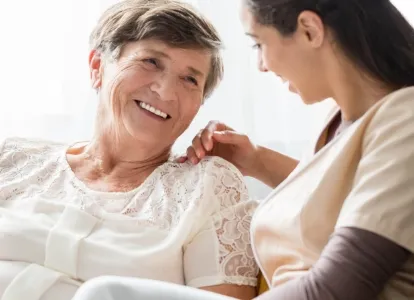How to Cope With Caregiver Grief: 5 Helpful Tips
Caregiving is an act of deep love and devotion, but it can also come with an emotional weight that’s difficult to put into words. When the caregiving journey ends, whether due to a loved one’s passing or a shift in circumstances, many caregivers are left navigating a profound sense of loss, identity confusion, and grief.
Throughout the caregiving journey, individuals often carry the burden of anticipatory grief. That constant emotional strain, coupled with the physical and mental demands of caregiving, can lead to complex emotions once the role ends. Feelings of guilt, exhaustion, sadness, and even relief may coexist, often catching caregivers off guard and making bereavement harder to name or share.
This moment calls for gentleness and compassion, both from others and from within. Understanding the nuances of caregiver grief is essential to healing, and so is creating space for self-care. In the following discussion, we’ll explore ways to honor the caregiving experience, support emotional recovery, and begin the process of rebuilding with empathy and grace.
The Complex Emotions of Grief
When caregiving comes to an end, the emotions that surface can be intense and wide-ranging. Caregivers may feel shock at the sudden change in routine, guilt over what they did or didn’t do, anger at the situation or themselves, and deep sadness over the loss of their loved one. Relief is also common, though it can bring its own layer of guilt or confusion. These feelings don’t follow a straight line, and it’s normal to experience them all, sometimes all at once.
One of the reasons caregiver grief can feel so complicated is the way caregiving blurs personal boundaries. When you’re both a spouse, child, sibling, or friend, it can be hard to untangle where the relationship ends and the caregiving begins. That dual role can deepen the emotional bond, but it also makes the loss more layered. Grieving isn’t just about saying goodbye to a loved one; it’s also about letting go of a role that shaped your identity and daily life.
Anticipatory Grief
Anticipatory grief is the deep sense of mourning that begins long before a loved one has passed. For caregivers, especially those supporting someone with a chronic illness or dementia, this type of grief often sets in gradually. As they witness the slow progression of a loved one’s decline, losing pieces of the person they once knew, grieving becomes a quiet, constant companion.
Caring for someone in this way means navigating daily losses: a fading memory, a diminishing ability, or a shift in personality. Each change can feel like a small goodbye, making the emotional toll heavier over time. Caregivers often find themselves preparing for an inevitable loss while still showing up each day to provide care, love, and presence. It’s a painful balancing act—one that deserves recognition, compassion, and support.
How Caregiver Grief Differs in Dementia Caregivers
Caring for someone with dementia or Alzheimer’s comes with a unique kind of heartache. The changes in memory, behavior, and personality can feel like a slow disappearance, creating a sense of mourning that’s difficult to explain to others.
Caregivers may grieve the loss of shared memories, meaningful conversations, and the emotional closeness they once had. Watching a loved one become distant or unfamiliar can be incredibly painful, especially when they no longer recognize familiar faces or respond in familiar ways. This complicated grief is real, layered, and deeply personal.
The Stages of Grief After Caregiving
#1 Shock and Denial
When caregiving comes to an end, whether through a loved one’s passing or a change in their needs, it can leave caregivers in a state of disbelief, even if the end was expected. The daily routines, responsibilities, and sense of purpose that filled their days suddenly vanish, leaving a void that’s hard to comprehend.
This shift can be especially disorienting, as caregivers may struggle to adjust to a life that no longer revolves around their loved one’s care. The loss of purpose can feel overwhelming, leaving many wondering how to fill the space they once dedicated entirely to another. It’s a time of profound transition, where the emotional and practical adjustments can take time to process.
#2 Anger and Guilt
The frustration of facing a loss or the exhaustion of caring for someone for so long can lead to feelings of resentment or helplessness. It’s important to remember that all of these emotions (i.e. anger, guilt, relief, and sadness) are valid. Grief is not a linear process, and caregivers shouldn’t feel they need to suppress or apologize for any of these feelings. Accepting and acknowledging these emotions is a vital part of the healing process, allowing caregivers to move forward with greater understanding of themselves and the complex journey they’ve been on.
#3 Acceptance and Moving Forward
Eventually, caregivers reach a point of acceptance, where the reality of the loss begins to settle. This acceptance doesn’t mean forgetting or moving on too quickly; it’s about finding peace with what has happened and beginning to heal. As part of this process, it’s essential for caregivers to find a new sense of purpose, whether through rediscovering passions, focusing on self-care, or reconnecting with parts of life that may have been put on hold during the caregiving journey.
While this new chapter begins, caregivers can still honor their loved ones’ memory in meaningful ways. Finding a balance between honoring the past and caring for oneself is crucial for healing and moving forward with grace.
How to Deal with Caregiver Grief: 5 Helpful Tips
Dealing with caregiver grief can be challenging, but there are ways to cope. Start by acknowledging all your emotions. Seek support from others who understand, such as support groups or trusted friends.
#1 Embrace Your Emotions Fully
Caregivers often feel the need to suppress or judge their grief, but it’s essential to process all the emotions without self-criticism. Whether it’s sadness, relief, guilt, or anger, each feeling is part of the healing journey. Allowing yourself to fully experience and acknowledge these emotions is crucial for emotional recovery. Only by embracing all the feelings that come with loss can caregivers begin to heal and move forward with a sense of peace and understanding.
#2 Seek Support
Connecting with others who have walked a similar path can be incredibly healing for caregivers. Support groups and conversations with fellow caregivers offer a sense of understanding, comfort, and shared experience that can ease the weight of grief. Simply knowing you’re not alone can provide a powerful source of strength. For those facing more complicated emotions, professional counseling or bereavement therapy can offer deeper support. Therapists trained in grief can help caregivers process their feelings, navigate the emotional aftermath, and begin to rebuild.
#3 Practice Self-Care During Grief
Support groups and talking to other caregivers who have experienced similar losses can be incredibly valuable. Professional counseling or bereavement therapy can also play a crucial role in processing complicated grief. A trained therapist can help caregivers navigate the complex emotions of loss, offering tools to manage difficult feelings and helping you work through the pain in a safe, supportive environment. Therapy can provide a space to explore grief deeply and support you in finding ways to heal and move forward.
#4 Giving Back and Honoring Loved Ones
Caregivers can honor the memory of their loved ones in meaningful ways that celebrate their life and legacy. Creating memorial activities, or creating a photo album or memory box filled with cherished moments, can keep their spirit alive, offering a tangible way to reflect on the love and joy shared. Another powerful way to honor a loved one is by continuing work in a cause they were passionate about, whether it’s volunteering, fundraising, or raising awareness in their name.
#5 Rebuilding Your Life Post-Caregiving
After caregiving ends, redefining identity and discovering new passions or hobbies can be healing and empowering at the same time. Consider activities that bring you joy or spark curiosity, whether it’s painting, hiking, learning a musical instrument, or joining a local class or group. Reconnect with old interests or explore new ones that offer a sense of fulfillment and growth. For those who spent time providing hospice support, rebuilding may also include reflecting on the valuable role you played during your loved one’s final chapter.
Provide End-of-Life Comfort With Silverts’ Adaptive Clothing
Silverts’ senior clothing is thoughtfully designed to support individuals with limited mobility or pain, especially during the end-of-life stage. With front-opening designs, magnetic closures, and soft, gentle fabrics, each piece makes dressing easier and more comfortable for both the individual and their caregiver.
These features offer more than just practicality. They provide a respectful, dignified way to assist with dressing, allowing loved ones to maintain comfort and a sense of self in their final days. Supporting loved ones through different types of care for seniors, from assisted living to hospice, means having the right tools can make a meaningful difference.
Moving Through Grief with Compassion
Grieving is a deeply personal journey, and there’s no one “right” way to go through it. Each caregiver’s experience is unique, shaped by their relationship, responsibilities, and the emotions carried along the way, especially for those who spent years balancing work and caregiving alongside their duties at home. It’s important to honor your own process and give yourself permission to heal in the way that feels right for you.
Don’t hesitate to reach out for support from loved ones, support groups, or professionals. Emotional recovery takes time, and there’s strength in asking for help when you need it. Above all, remember that grief is a natural part of the caregiving journey. Be gentle with yourself, and allow self-compassion to guide you toward peace and healing.





No Comments